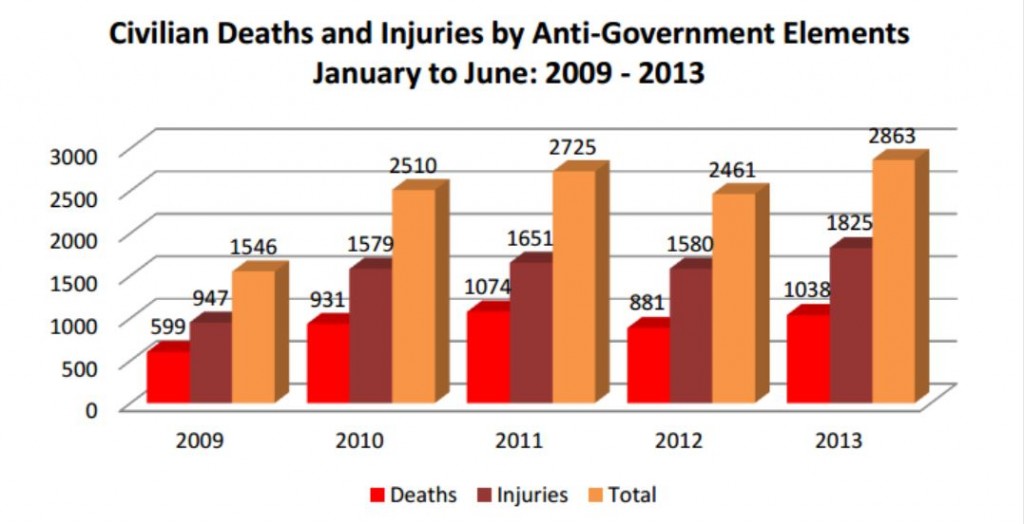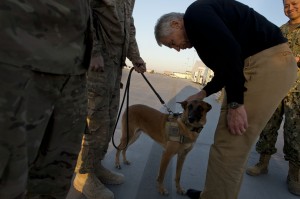Latest Night Raid Afghan Civilian Deaths Put BSA into Further Doubt
Back in October, I noted that one of Hamid Karzai’s primary barriers to signing the Bilateral Security Agreement is his objection to night raids carried out by US-trained death squads because of the high rate of civilian casualties involved. Yesterday, yet another night raid went bad, but this time, instead of the death squad killing civilians, an air raid called in when the raiding party came under heavy fire was responsible for civilian deaths. In an attempt to deflect blame, ISAF tried to emphasize that this mission was Afghan-led:
International Security Assistance Force regrets that civilians were killed Jan. 15 during a deliberately-planned, Afghan-led clearing operation to disrupt insurgent activity in Ghorband district, Parwan province.
The mission, led by commandos of the 6th Special Operations Kandak and supported by ISAF special operations advisers, was conducted to disrupt insurgent activities in the district, including attacks on Bagram Airfield, and in support of Afghan National Security Forces’ tactical priorities. Local district and provincial officials were informed in advance of the operation and were provided updates during and after the actions.
It would not surprise me if ISAF eventually blames the “local district and provincial officials” who were warned for tipping off the insurgents so that an ambush could be carried out. But note that “ISAF special operations advisers” were present, and as I have noted previously, this is the hallmark of the US-trained death squads that have previously operated with impunity but have infuriated Karzai. Even though ISAF is claiming that the intelligence for the operation was generated by the Afghans, you can bet that our “advisers” would not have ventured off their base if our own intelligence hadn’t also been involved in planning the attack.
Strangely, the NYTimes article linked above puts the operation taking place at 6:30 am, but the Washington Post puts it at 1 am, which fits night raid timing much better. The details in the two stories differ substantially. From the Times:
Aziz Ahmad Zaki, a spokesman for the governor of Parwan, said that the coalition Special Operations advisers had come to assist the Afghan forces in the area, setting up alongside them in a district check post that quickly came under fire from Taliban attackers on Tuesday.
Around 6:30 a.m. Wednesday, Afghan and coalition forces began a clearance operation in the Wazghar Valley, but ran into a Taliban ambush, taking fire from several compounds in the area at once, officials said.
“Afghan and coalition forces returned fire and required defensive air support to suppress the enemy fire,” according to the coalition statement.
But according to the Post, the raiding party attempted to enter a home at 1 am, rather than conducting a “clearing operation” at 6:30:
According to Karzai and the governor of Parwan province, the incident occurred about 1 a.m. when U.S. Special Forces attempted to enter a home. A gun battle ensued, resulting in a coalition airstrike that killed the children and a female relative in the house, they said.
This version says nothing about being attacked at a checkpost but instead follows a usual night raid routine.
Karzai is furious. From AFP:
President Hamid Karzai on Wednesday accused the United States of killing seven children and a woman in an airstrike in central Afghanistan — an incident set to further damage frayed ties between the two allies.
Relations between Washington and Kabul have been rocky for years, and negotiations over an agreement that would allow some US troops to remain in the country after this year have broken down into a long-running public dispute.
“As a result of bombardment by American forces last night… in Siahgird district of Parwan province, one woman and seven children were martyred and one civilian injured,” a statement from Karzai’s office said.
“The Afghan government has been asking for a complete end to operations in Afghan villages for years, but American forces acting against all mutual agreements… have once again bombarded a residential area and killed civilians.
The zero option in Afghanistan is looking more and more likely.


